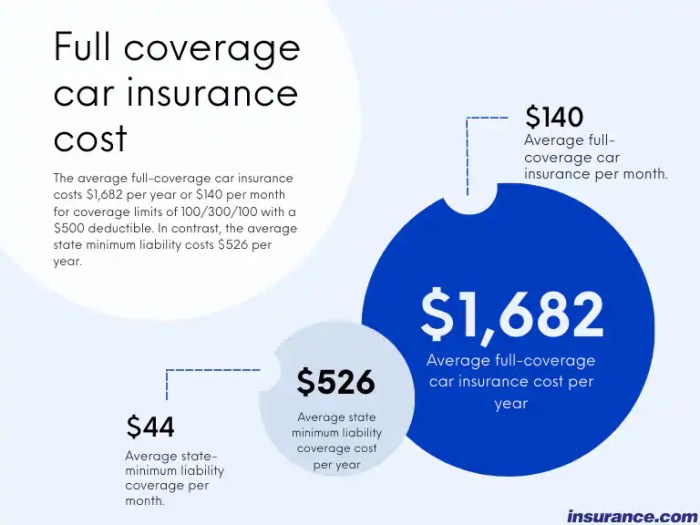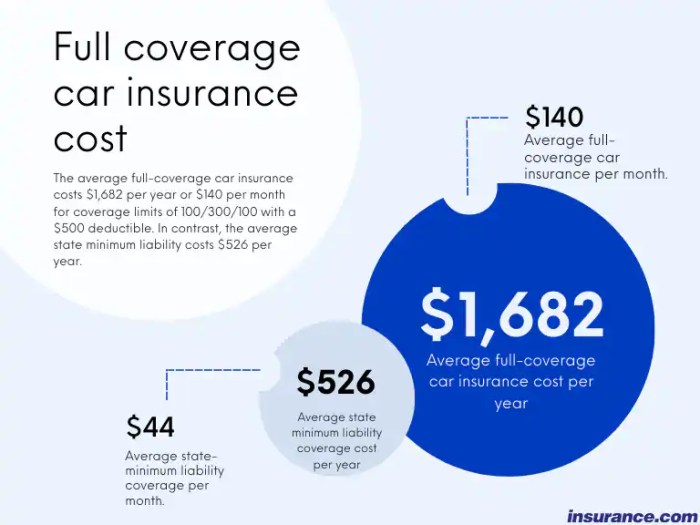Free full coverage car insurance quotes can seem like a dream come true, promising affordable protection for your vehicle. But the reality is a bit more nuanced. These “free” quotes are simply estimates, and the actual cost of your insurance will depend on a variety of factors. Understanding the limitations of “full coverage” and the factors that influence pricing is crucial to finding the best deal for your needs.
Table of Contents
The process of securing car insurance can be overwhelming, but it doesn’t have to be. By understanding the different types of coverage, comparing quotes from multiple providers, and negotiating for discounts, you can find a policy that offers comprehensive protection at a price you can afford. This guide will provide you with the knowledge and tools to navigate the car insurance landscape confidently and make informed decisions about your coverage.
Finding Reputable Insurance Providers
Finding the right car insurance provider can be a daunting task, especially with so many options available. To ensure you’re getting the best coverage at a competitive price, it’s crucial to prioritize finding a reputable and trustworthy insurance company.
Evaluating Insurance Providers
Before making a decision, it’s essential to evaluate potential insurance providers based on various factors that influence their reliability and customer satisfaction. These factors can be grouped into two main categories: financial stability and customer service.
- Financial Stability: This refers to the insurance company’s ability to fulfill its financial obligations to policyholders, especially in the event of a major claim. It’s crucial to choose a financially stable provider to ensure you’re not left without coverage when you need it most.
- Customer Service: A good insurance provider should offer excellent customer service, including prompt and helpful assistance with claims processing, policy inquiries, and general customer support. Positive customer service experiences are essential for a smooth and hassle-free insurance experience.
Trusted Resources for Finding Car Insurance Quotes
Several trusted resources can help you find car insurance quotes and evaluate potential providers.
- Comparison Websites: Websites like Policygenius, NerdWallet, and Compare.com allow you to compare quotes from multiple insurance companies simultaneously, making it easier to find the best deals.
- Insurance Company Websites: Most insurance companies have websites where you can get a free quote and learn more about their coverage options and policies.
- Independent Insurance Agents: Independent insurance agents can help you compare quotes from various companies and provide personalized recommendations based on your specific needs.
Key Factors to Consider
When evaluating insurance companies, consider these key factors:
- Claims Handling Processes: Look for companies with a proven track record of handling claims efficiently and fairly.
- Customer Service: Check customer reviews and ratings to get a sense of the company’s reputation for customer service.
- Coverage Options: Compare coverage options and make sure the provider offers the types of coverage you need, such as liability, collision, comprehensive, and uninsured motorist coverage.
- Pricing and Discounts: Compare quotes from different companies and look for discounts that can lower your premiums.
- Financial Stability: Check the company’s financial ratings from organizations like AM Best and Standard & Poor’s to assess their financial stability.
Understanding Insurance Coverage Options

Car insurance is designed to protect you financially in the event of an accident or other covered incidents. It’s essential to understand the different coverage options available to ensure you have the right protection for your needs and budget. This section will explore common car insurance coverage types, their purpose, and the situations where they may be most valuable.
Liability Coverage
Liability coverage is the most basic and often required by law. It protects you financially if you cause an accident that injures someone or damages their property. Liability coverage comes in two parts:
* Bodily Injury Liability: This coverage pays for medical expenses, lost wages, and other damages incurred by the other driver or passengers in the accident if you are at fault.
* Property Damage Liability: This coverage pays for repairs or replacement of the other driver’s vehicle or property if you are at fault.
The amount of liability coverage you need depends on factors like your state’s minimum requirements, your driving record, and your assets.
Collision Coverage
Collision coverage protects your own vehicle in the event of an accident, regardless of who is at fault. It pays for repairs or replacement of your vehicle if it is damaged in a collision with another vehicle or object.
Collision coverage is typically recommended for newer vehicles, vehicles with high market value, or if you have a loan or lease on your car.
Comprehensive Coverage
Comprehensive coverage protects your vehicle from damage caused by events other than a collision, such as theft, vandalism, fire, hail, or natural disasters.
Comprehensive coverage is often recommended for newer vehicles or vehicles with high market value.
Uninsured/Underinsured Motorist Coverage
Uninsured/underinsured motorist coverage (UM/UIM) protects you if you are involved in an accident with a driver who has no insurance or insufficient insurance.
* Uninsured Motorist (UM) Coverage: Pays for damages if you are hit by a driver without insurance.
* Underinsured Motorist (UIM) Coverage: Pays for damages if you are hit by a driver with insufficient insurance to cover your losses.
UM/UIM coverage is crucial, especially in areas with a high percentage of uninsured drivers.
Tips for Getting the Best Quotes: Free Full Coverage Car Insurance Quotes

Getting the best car insurance quote involves a combination of proactive steps and understanding how factors influence your premiums. By taking control of these aspects, you can significantly reduce your insurance costs.
Improving Driving History
A clean driving record is the foundation for lower insurance premiums. Insurance companies consider your driving history as a key indicator of your risk. Here are some tips to maintain a favorable driving record:
- Avoid Traffic Violations: Every speeding ticket, reckless driving citation, or DUI conviction significantly increases your insurance premiums. Drive defensively and follow traffic laws diligently.
- Maintain a Safe Driving Record: Avoid accidents, as even minor fender benders can impact your rates. Defensive driving techniques and being aware of your surroundings can minimize the risk of accidents.
- Consider Defensive Driving Courses: Completing a certified defensive driving course can demonstrate your commitment to safe driving practices. Many insurance companies offer discounts for course completion.
Bundling Policies
Combining multiple insurance policies with the same company often leads to significant discounts. This is known as bundling.
- Home and Auto Insurance: Bundling your homeowners or renters insurance with your car insurance can often result in a substantial discount on both policies.
- Other Policies: Some insurance companies offer discounts for bundling additional policies like life insurance, health insurance, or even pet insurance.
Negotiating Discounts
Many insurance companies offer discounts for various factors. It’s crucial to inquire about these discounts and actively seek them out.
- Good Student Discounts: Many insurers offer discounts to students with good academic records. Provide proof of good grades or academic achievements to qualify.
- Safety Features: Vehicles equipped with advanced safety features, such as anti-theft systems, airbags, and anti-lock brakes, are often eligible for discounts. Inform your insurance provider about your vehicle’s safety features.
- Payment Frequency: Paying your premiums annually or semi-annually may result in a discount compared to monthly payments.
- Loyalty Discounts: Some insurers reward long-term customers with loyalty discounts. Ask about any available discounts for being a loyal customer.
Impact of Vehicle Safety Features
Modern vehicles equipped with advanced safety features are often considered lower risk by insurance companies, leading to lower premiums.
- Anti-lock Brakes (ABS): ABS helps prevent wheel lock-up during braking, enhancing control and reducing the risk of accidents. Many insurers offer discounts for vehicles with ABS.
- Airbags: Airbags deploy in the event of a collision, providing crucial protection for occupants. Vehicles with airbags are often eligible for discounted premiums.
- Electronic Stability Control (ESC): ESC helps maintain vehicle control during slippery conditions or sudden maneuvers, reducing the risk of skidding or rollovers. Insurance companies often recognize vehicles with ESC with lower rates.
Impact of Driving Habits
Your driving habits play a significant role in determining your insurance premiums. Insurance companies use various methods to assess your driving behavior, including:
- Telematics Devices: These devices track your driving habits, such as speed, acceleration, and braking patterns. By demonstrating safe driving, you may qualify for discounts.
- Usage-Based Insurance (UBI): UBI programs use telematics data to adjust your premiums based on your driving behavior. Safe drivers can earn lower rates through UBI programs.
Exploring Alternative Coverage Options
In certain situations, exploring alternative coverage options can help you save money.
- Higher Deductibles: Choosing a higher deductible means you pay more out of pocket in case of an accident, but it can significantly reduce your premiums.
- Limited Coverage for Older Vehicles: For older vehicles with lower market value, you may consider reducing your coverage, such as opting for liability-only coverage or dropping collision and comprehensive coverage.
Avoiding Common Pitfalls
Finding the best car insurance quote involves more than just filling out online forms and comparing prices. Avoiding common pitfalls can significantly impact your insurance costs and coverage.
Providing Accurate Information
It’s crucial to provide accurate information when seeking car insurance quotes. Providing inaccurate information, even unintentionally, can lead to higher premiums or even policy cancellation.
- Incorrect Personal Information: Mistakes in your name, address, date of birth, or driving history can affect your eligibility and premium calculations.
- Misrepresenting Vehicle Details: Providing inaccurate details about your vehicle, such as its year, make, model, or mileage, can result in incorrect coverage or higher premiums.
- Omitting Relevant Information: Failing to disclose any accidents, traffic violations, or driving history issues can lead to policy cancellation if discovered later.
Comparing Quotes Thoroughly, Free full coverage car insurance quotes
Accepting the first quote you receive without comparing options can lead to paying more than necessary.
- Multiple Quotes: Get quotes from several reputable insurance providers to compare coverage, deductibles, and premiums.
- Coverage Levels: Ensure that the quotes you compare offer the same level of coverage. Different providers may have different definitions of “full coverage.”
- Hidden Fees: Be aware of any hidden fees or surcharges that may not be immediately apparent in the initial quote.
Understanding Policy Terms and Conditions
Before accepting an insurance quote, it’s crucial to understand the policy’s terms and conditions.
- Deductibles: Understand the deductible amount you’ll be responsible for paying in case of an accident or claim.
- Coverage Limits: Know the maximum amount your insurance will pay for specific types of claims, such as bodily injury or property damage.
- Exclusions: Be aware of any situations or events not covered by your policy, such as driving under the influence or certain types of accidents.
Not Understanding Your Needs
Failing to consider your individual needs and driving habits can lead to inadequate coverage or unnecessary expenses.
- Driving Habits: Consider your average mileage, driving frequency, and the areas you typically drive in.
- Vehicle Value: Determine the actual cash value of your vehicle to ensure you have adequate coverage in case of a total loss.
- Risk Tolerance: Evaluate your comfort level with risk and the amount of deductible you’re willing to pay.
Understanding Your Policy and Making Changes
Your car insurance policy is a legal contract that Artikels the terms and conditions of your coverage. It’s crucial to understand the details of your policy to ensure you’re adequately protected and avoid any surprises.
Reviewing Your Policy
It’s essential to carefully review your car insurance policy to understand the coverage you have, the limits and exclusions, and the terms and conditions. Here’s a guide to help you:
- Read the entire policy document: Take the time to read through the entire policy document, paying attention to the fine print. Don’t just skim it.
- Understand key terms and definitions: Familiarize yourself with the definitions of important terms used in the policy, such as “deductible,” “liability coverage,” and “comprehensive coverage.”
- Review coverage details: Pay close attention to the specific coverage you have, including the limits, exclusions, and any conditions that may apply.
- Clarify any uncertainties: If you have any questions or uncertainties about your policy, don’t hesitate to contact your insurance agent or company for clarification.
Making Changes to Your Policy
You may need to make changes to your car insurance policy at some point. These changes might include:
- Adding or removing coverage: You may need to add or remove coverage based on your individual needs and circumstances. For instance, you might add collision coverage for a new car or remove rental car coverage if you no longer need it.
- Updating vehicle information: If you purchase a new car or sell your existing car, you’ll need to update your policy to reflect the change in vehicle information.
- Modifying payment methods: You can change your payment method, such as switching from monthly payments to annual payments or updating your credit card information.
- Changing your address: If you move, you’ll need to notify your insurance company of your new address to ensure you continue to receive policy updates and important communications.
Obtaining Support and Assistance
Your insurance company is your primary resource for understanding and making changes to your policy. You can contact your insurance agent or customer service representative for assistance with:
- Policy explanations: They can help you understand the different coverage options and the terms and conditions of your policy.
- Making policy changes: They can help you make changes to your policy, such as adding or removing coverage, updating vehicle information, or modifying payment methods.
- Resolving claims: If you need to file a claim, your insurance company will provide guidance and support throughout the process.
Maintaining Your Insurance Coverage
Once you’ve secured your car insurance policy, it’s crucial to understand how to maintain it effectively. This involves ensuring continuous coverage by paying your premiums on time and knowing how to navigate the claims process if needed.
Paying Premiums on Time
Paying your car insurance premiums on time is essential to keep your policy active. Failure to do so can lead to a policy lapse, leaving you without coverage in the event of an accident.
- Most insurance companies offer various payment options, such as monthly installments, quarterly payments, or annual payments. Choose the option that best suits your budget and financial planning.
- Set reminders for your premium due dates to avoid missing payments. You can use calendar apps, online banking tools, or even set up automatic payments from your bank account.
- If you experience financial difficulties, contact your insurance company immediately. They may be able to offer temporary payment arrangements or explore other options to help you avoid policy lapse.
Filing a Claim
In the unfortunate event of an accident or other covered incident, you’ll need to file a claim with your insurance company.
- Report the incident promptly, usually within 24 hours, to your insurance company. Provide accurate details of the accident, including the date, time, location, and parties involved.
- Gather evidence such as photos of the damage, police reports, and witness statements. This will help support your claim.
- Follow the instructions provided by your insurance company. They will guide you through the claims process and provide the necessary forms.
Understanding the Claims Process
The claims process can vary depending on the insurance company and the nature of the incident. However, it typically involves the following steps:
- Initial Report: After reporting the incident, your insurance company will assign a claims adjuster to handle your case.
- Investigation: The adjuster will investigate the claim, gather information, and assess the damages.
- Negotiation: Once the investigation is complete, the adjuster will negotiate a settlement amount with you. This may involve discussing the cost of repairs, replacement parts, or medical expenses.
- Payment: If you agree to the settlement amount, your insurance company will issue payment to you or directly to the repair shop or medical provider.
Renewing Your Car Insurance Policy
Your car insurance policy will expire after a specific period, typically a year. To ensure continuous coverage, you need to renew your policy before the expiration date.
- Your insurance company will typically send you a renewal notice in advance of the expiration date. Review the notice carefully and ensure that the coverage and premium are still acceptable to you.
- If you’re happy with your current coverage and premium, you can renew your policy online, over the phone, or through your insurance agent.
- If you want to make changes to your coverage or explore other options, contact your insurance company to discuss your options.
In the end, securing free full coverage car insurance quotes is just the first step in the journey to finding the right insurance policy. By taking the time to compare quotes, understand your coverage options, and negotiate for the best rates, you can ensure that you have the protection you need without breaking the bank. Remember, car insurance is a crucial investment in your financial well-being and peace of mind.
Finding free full coverage car insurance quotes can be a bit of a challenge, but it’s definitely worth the effort. You can start by comparing rates from different insurance companies, and remember to consider your driving history and the type of coverage you need. To make things easier, you can buy cheap car insurance online now and compare quotes from the comfort of your own home.
By taking the time to shop around and compare quotes, you can potentially find the best free full coverage car insurance quotes for your needs.


